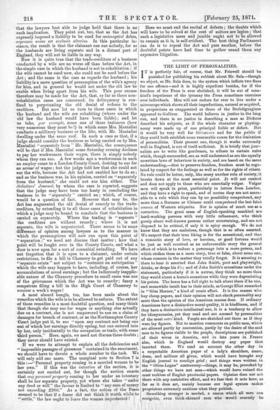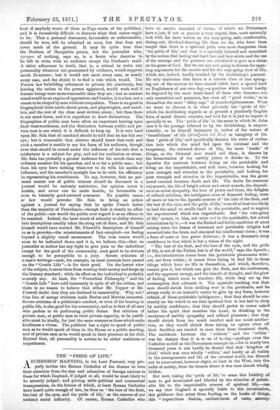THE LIMIT OF PERSONALITIES.
T is perfectly fair, of course, that Mr. Friswell should be
punished for publishing his rubbish about Mr. Sala—though we object, as Mr. Sala does, to the system which inflicts two fines for one offence—and it is highly expedient besides, for if the freedom of the Press is ever abolished, it will be out of man- kind's impatience of the tyranny the Press sometimes exercises over individuals. Men will not endure for ever to live under a microscope which shows all their imperfections, natural or acquired, in proportions as exaggerated as those of the Brobdignagians appeared to Gulliver. The world believes in justice in the long run, and there is no justice in describing a man as Dickens described his subjects, as if the whole character or physiog- nomy were made up of one principal foible or defect. But it would be very well for litte'rateurs and for the public if they could both establish some reasonable canon for the limitation of personalities. Their present one, though it works extremely well in England, is not of itself sufficient. It is briefly that jour- nalists are to write like gentlemen, to adhere to certain rules which, though unrecorded, are as well understood as are the equally unwritten laws of behaviour in society, and are based on the same understanding,—that to preserve freedom, freedom must be regu- lated by respect for the feelings as well as for the rights of others. No rule could be better, only, like many another rule of society, it breaks down at the most essential point. Jt will not control and does not apply to those who are essentially vulgar. Vulgar men will speak in print, particularly in letters from London, and they have a right to speak, and of course they are not amen- able to a rule which they can by no possibility comprehend, any more than a Burmese or Chinese could comprehend the last faint nuance of Western etiquette. Nor is opinion of much use as a corrective. The great mass of English-speaking mankind are hard-working persons with very little refinement, who think gossip about well-known persons rather entertaining, and are not disposed to be critical, if only it is spicy enough. We do not know that they are malicious, though that is so often asserted. We suspect that their true liking is for the sensational, and that a romantic story of love, or heroism, or good fortune would be just as well received as an unfavourable story the general effect of which is to reduce a personage into a mere person, and which strikes them as a mere story, true or false, about some one, whose concern in the matter they totally forget. It is amusing to them to hear it asserted that John Smith, poet and playwright, drinks, or drops his h'.; and of John Smith's sensations under the statement, particularly if it is untrue, they think no more than they would about a horse's sensations while they were depreciating his points. The horse has a full right to talk about them if he can, and meanwhile insult has to their minds, as George Eliot remarked in "Silas Marner," a kind of comic effect. It is the masses who buy cheap papers, and their opinion will not check personality any more than the opinion of the American masses does. If ordinary Americans have a distinctive moral quality, it is kindliness, and if they have a distinctive intellectual one, it is a tendency to allow for idiosyncrasies, yet they read and are amused by personalties of the most outré kind. People are sketched out there as if they were lay figures. Not to mention comments on public men, which are allowed partly by convention, partly by the desire of the said men to be figures visible to the people, descriptions are published of their wives in America, and in late years in France also, which in England would destroy any paper that inserted them. We read an account the other day in a respectable American paper of a lady's shoulders, name, dress, and milliner all given, which would have brought any English journal to condign grief ; and things were written in the " Olive-Logan" controversy—things, it may be, provoked by other things we have not seen—which would have ruined the most reckless of English provincial papers. Opinion does not act there with any restrictive effect, and we fear that it acts here, as far as it does act, mainly because our legal system makes proprietors extremely cautions what they publish.
Something stronger is needed, a canon which all men can recognize, even thick-skinned men who would scarcely be hurt if anybody wrote of them as Pope wrote of his publisher, and it is excessively difficult to discover what that canon ought to be. That a personal statement, favourable or unfavourable, should be true, will be admitted at once, but that does not cover much of the ground. It may be quite true that the Duchess of Hampshire paints, but the journalist who, apropos of nothing, says so, is a brute who deserves to be left to write with no audience except the Duchess's maid. A strict adherence to truth, that is, a refusal to write any personality whatever not guaranteed by evidence, would suppress much ill-nature ; but it would not meet every case, or nearly every case, and the object is to find a rule which would. The French law forbidding references to private life absolutely, but leaving the action to the person aggrieved, would work well if human beings were more reasonable than they are ; but as matters stand would be an engine of oppression; and besides, it is a law, not a canon to be obeyed by men without compulsion. There is no good in biographical tittle-tattle about poets, and playwrights, and novel- ists, and the rest of the class most written about ; but then there is not much harm, and it is expedient to draw distinctions. The biographies of public men have often an important bearing upon their trustworthiness, and the distinction between public and pri- vate men is one which it is difficult to keep up. It is very hard upon Mr. Sala that all mankind should be told that he has but one eye ; but is reasonable that electors should know that such and such a member is unable to see the faces of his audience, though even that should be stated under the influence of the rule that a misfortune is a subject for pity, and not for exultation or abuse. Mr. Sala has probably a greater audience for his novels than any ordinary member for his speeches, and is so far a public man ; but then his eyes have nothing whatever to do with his merits or influence, and the member's eyesight has to do with his efficiency in representing his constituents. To say, however, that no per- sonal matter not of public interest should be discussed in a journal would be uselessly restrictive, for opinion never is hostile, and never can be made hostile, to favourable or even to tolerably good-natured comment. No possible canon or law would provoke- Mr. Sala to bring an action against a journal for saying that he spoke French better than the majority of Frenchmen—though that is clearly no affair of the public—nor would the public ever regard it as an offence to be resented. Indeed, the least touch of urbanity or ability thrown into descriptions usually takes the sting out of them, and Mr. Sala himself would have worded Mr. Friswell's description of himself so as to provoke—the misstatements of fact excepted—no feeling beyond a slightly vexed amusement. The true canon would seem to be indicated there,.and it is, we believe, this—that no journalist or author has any right to give pain to the individual except for the good of the community, such good to be obvious enough to be perceptible to a jury. Severe criticism of a man's writings—such, for example, as most journals have passed on the " Gentle Life "—is for their good. On the lowest view of the subject, it saves them from wasting their money and keeps up the literary standard ; while its effect on the individual is probably scarcely any. At least, the " Proverbial Philosophy " and the " Gentle Life " have sold immensely in spite of all the critics, and there is no reason to believe that either Mr. Tupper or Mr. Friswell doubt that they are destined to immortality. Why not? One line of savage criticism made Bavius and Mmvius immortal. Severe criticism of a politician's conduct, or even of his bearing in public life, is also good for the community, and so is that of all men who profess to be performing public duties. But criticism of private men, or public men in their private capacity, to be justifi- able must be kindly, for just the same reasons as those which make kindliness a virtue. The publicist has a right to speak of public men as he would speak of them in the House or a public meeting, and of private men as he would speak in their presence at his club. Beyond that, all personality is certain to be either malicious or impertinent.



































 Previous page
Previous page